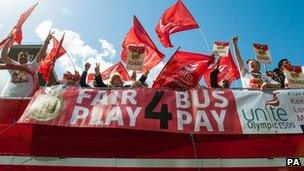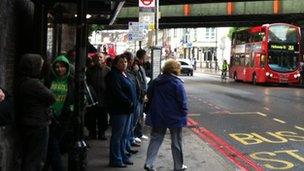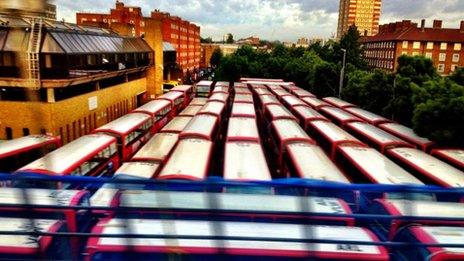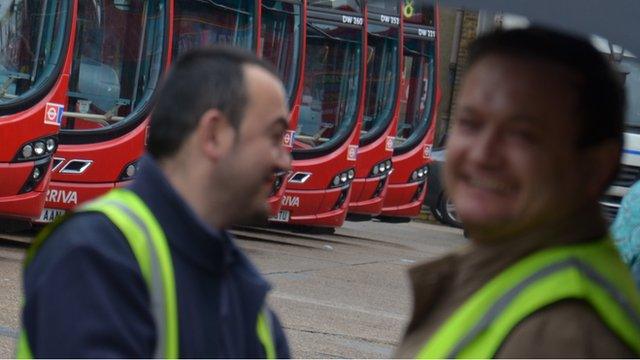London 2012: Is it about sport or transport?
- Published
- comments

The London bus drivers' dispute could drag on into the London 2012 Games itself
It's a management quip at Transport for London (TfL) that goes: "We want the Olympics to be about sport and not transport".
At the moment that's not happening.
I've sat in the cafe next to the conciliation service Acas many times. I've covered many strikes.
This time sitting in the cafe there were many more phone calls from colleagues wanting to know what was going on - because this time the stakes are much, much higher.
Crucially this dispute could drag on into the Games itself which would be a massive embarrassment.
Unprecedented move
On Thursday at Acas, the Unite union and the bus companies spent seven hours unsuccessfully trying to avert the strike.
It was left very late in the day, but an extra £8.3m Olympics money was found to try and appease the bus drivers who want a £500 bonus for working during the Games.
On Wednesday the mayor, in an unprecedented move, tried to sweeten the deal with the cash - and he failed.
This isn't thought to be the first Olympics dispute, and it won't be the last.
The crux of this dispute is that bus drivers feel it's unfair lots of other transport workers are getting bonuses and they are not.
A lot of Londoners sympathise with that.
TfL estimates an extra three million journeys a day will be made on the transport network during the Games.
It is at near capacity at the moment coping with 12 million trips a day. And when it goes wrong, it goes wrong quickly and has huge knock-on effects.
There is also an element of Olympics inflation in London.
The unions are sensing an opportunity to make money for their members and they're taking it. The operators have little option but to play ball in many cases.
The big deals with the Tube drivers (up to £850) the London Overground, Docklands Light Railway (£950), Network Rail (£500) and Heathrow Express (£700) are all done - but others are continuing.
Other disputes that are as yet unresolved are on South West Trains, First Great Western and Greater Anglia. Ballots for strike action are being carried out there. Also the issue of Olympics payments has been raised on Mayor Boris Johnson's flagship Boris bikes.
By late afternoon on Thursday we had heard the bus strike talks had failed.
An injunction limited the strike to 17 operators. There was not enough money in the pot for the unions. It's unclear if the extra £8.3m will now stay on the table - it seems unlikely.
Station hotspots
So how busy will it be during the Games in London?
It's difficult to tell as we don't know how many people will stay away.
TfL needs a 30% drop at some stations to make it bearable.
Even then the hotspots like London Bridge, Canary Wharf and Bank will be packed.

TfL needs a 30% drop in commuters at some stations so it can manage during the Olympics
TfL is advising commuters to avoid those stations. But even with the drop, the modelling shows queues of over 45 minutes to get on some trains.
On the roads expect congestion around the venues in central London and the Olympic Route Networks, external.
The good news is the message to London's commuters can get through.
If you look at what happened on the Jubilee weekend, drivers did avoid central London. That weekend though the rail companies did fail to put on enough carriages.
Also the Olympic Park itself is served by many underground and rail lines. So there is resilience there.
The slight catch is London commuters are an extremely canny bunch and if they sense the congestion isn't that bad they will flood back with obvious consequences.
In Vancouver during the 2010 Winter Olympics, they called the tactic to try and keep commuters away "the big scare".
Will it work in a mega-city like London? And will the messages to get commuters to change their habits be effective over a long period of time?
Will London 2012 be about the sport or transport?
- Published23 June 2012

- Published22 June 2012

- Published20 June 2012
- Published28 May 2012